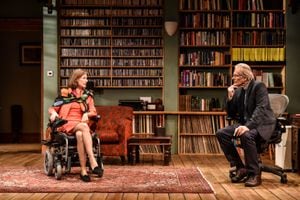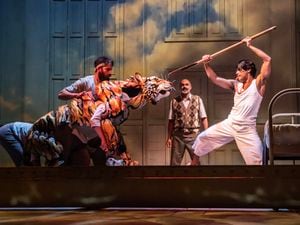Duet for One, Birmingham REP - review with pictures
There’s an interesting note in the programme for Duet by the playwright himself. He says that there is a myth about Duet which has existed for nearly forty years since it first appeared. The myth is that the play is based on the life of cellist Jacqueline du Pré, which Tom Kempinski says is not so—it is fake news!

He claims that the play is a metaphor for his own life, with him denying the dangerous feelings of his own actual, inner existence.
However, he offers no evidence for this. The play has had many revivals since its 1980 premiere, and was turned into a film starring Julie Andrews (for which he wrote the screenplay). There has never been the slightest hint that the vast majority of critics and commentators have been misinforming the public.
The parallels with Jacqueline du Pré’s life are obvious. She was stricken with multiple sclerosis in 1971 after she had established herself as one of the world’s leading cello players, but had to withdraw from performing. She taught, and worked for MS charities, until her death in 1987 at the age of 42.
Her performance of the Elgar Cello Concerto can still be seen on You Tube, and it was such a land-mark performance of the work that her tutor and mentor, the world-renowned cellist Mstislav Rostropovich, withdrew the piece from his repertoire because he believed that she played the music much better than he ever could.
Duet for One has world famous violinist Stephanie Abrahams trying to come to terms with the on-set of multiple sclerosis which has left her confined to a wheel-chair. She seeks the help of psychiatrist Dr Feldmann to try to come to terms with her illness and to face the future without the driving force of her life.
He treats her with various anti-depressants, but the play basically deals with the doctor-patient relationship. He needs to peel away the layers of her personality, but there has to be complete trust on both sides for that to happen.
We learn in the process that her mother died when she was young and that she had to battle with her father to pursue her dream as a violinist.
She also has a strange relationship with her husband, who she describes as a composer of “post-modernistic gibberish.” Patient and doctor discuss the meaning of life, which apparently is a bowl of chicken soup—although this old Jewish joke loses some of its meaning.
The play is beautifully acted with Belinda Lang capturing the character of the tormented violin virtuoso Stephanie with great empathy and without ever becoming a stereo-type over-emotional victim. Oliver Cotton’s Dr Feldmann is generally quietly supportive and sympathetic to his patient’s needs.
Unfortunately, the set for this Birmingham REP, Lee Dan and Daniel Schumann production has the two actors facing each other for most of the time. This meant that Dr Feldmann’s lines were often delivered to the left hand side of the auditorium, thus making it difficult to hear his words at times due to the vagaries of the REP acoustics.
The need for the duo to become mutually interdependent becomes obvious as the play progresses, but I wasn’t convinced that they had totally succeeded in demonstrating that.
But, overall, this is a production of the high quality and a most engrossing piece of theatre.
Duet for One runs until 7th October.
By Jerald Smith




